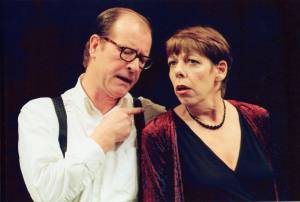The Play About The Baby
Too Young to Suffer? Edward Albee's latest play is a
dark and witty story of innocence and life's painful scars
|
It's not surprising that the latest work from
the American playwright Edward Albee, The Play About the Baby, should
premiere in London's hottest fringe theater, the Almeida. Albee's relationship
with critics has often been bumpy and he makes no secret of his belief that
neither Broadway nor London's West End is the center of the theater universe.
His first major play, The Zoo Story, opened in Berlin in 1959, Three
Tall Women played first in Vienna, in 1991, and for several years in the
'80s Albee's plays were more often seen in smaller European, Latin American and
U.S. venues than in New York or London. |

|
His occasional grumpiness has not hindered Albee's
success, a few unexceptional pieces notwithstandingSo in the thin recent years
London audiences and critics have adored restagings of Three Tall Women,
A Delicate Balance and Who's Afraid of Virginia Woolf?
So the three-time Pulitzer Prize winner has usually
gone his own way, and he does it again with The Play About the Baby, a
dark and witty account of two couples--the combination of jaded Man and Woman
vs. innocent Boy and Girl that provided a similar dramatic tension in 1962's
Virginia Woolf. Whether or not it turns into the same sort of
blockbuster--Virginia Woolf won a Pulitzer only after contention in the
prize committee but caught the public ear and later became a hit movie--this
startling play will add to his reputation as a great American playwright.
The Play About the Baby is packed with
familiar Albee themes--memory, illusion, self-deception, repetition--but each
seems fresh rather than stale. Dressed in Albee's artful language, a notion
like illusion becomes a sharp probe into human need and frailty, a new critique
of society, not a rehash. The acting, too, is of the brilliant standard that
audiences can expect from the Almeida. As Man, Alan Howard is sinister and wry.
As Woman, the arch Frances de la Tour has a spectacular range of expression and
Albee gives her plenty to play with: she vamps around the stage, recalling a
youth of handsome lovers, and tosses off such unlikely lines as "What a wangled
teb we weave" with real panache. Her entire performance is one great nod and
wink. Girl, a young mother played sweetly by Zoe Waites, could be cloying but
isn't. Rupert Penry-Jones, as Boy, can signal youth, sexual potency and
invincibility as well as he telegraphs fear and pain.
There is plenty of fear and pain for the young
couple. Man and Woman conspire to undermine Boy and Girl, to drive them mad
with grief and then mad with doubt. The two couples are different: one scarred,
full of history; the other untouched except by love, hope and the magic of
parenthood. As they begin to learn the ways of older couples--how to
communicate, how to deal with jealousy--they are at least dimly aware of their
innocence. When the cruelty mounts, Boy pleads for mercy: "I can take pain and
loss and all the rest--later. But now we're happy. We love each other. I'm hard
all the time. We don't even understand each other yet."
Much of the play is about truth and storytelling, the
easy embroidery of anecdote or biography. Is the story of a relationship
between two people one history, or two? If you had to, how would you prove who
you are, or who you once were? Man suggests that reality is a human creation:
"How things fade! We are left with invention, reinvention. Our reality is
determined by our need."
Albee experiments with form, toying with the
conventions of drama. Like the young couple whose story is doubted and
undermined, the audience itself is made uncomfortable, forced to doubt, by
un-actorly behavior. The play repeats itself disconcertingly and is dissected
by the cast. "I love this speech," Man whispers to the crowd. In other asides,
the actors pretend not to be actors.
One reason the play works so well may be the cast's
extensive familiarity with Albee. Frances de la Tour was in Three Tall
Women and director Howard Davies directed the revival of Virginia
Woolf as well as a recent staging, again at the Almeida, of Eugene
O'Neill's The Iceman Cometh--another play of self-deception and
repetition.
Baby is Albee's first major work since 1991's
Three Tall Women, and despite the huge popularity of recent restagings
and his own success, he is aware that every new play hangs out there, naked. "I
have no idea how a mass of people will respond to a dramatic event I have
longed to subject them to," he writes. "I never know. I live in a state of
startlement, I guess." A playwright, in other words, is not so very different
from his audience.
Nina Planck,
Time International.
London,
The Arts, Theater:
14.9.1998, pp 62.
